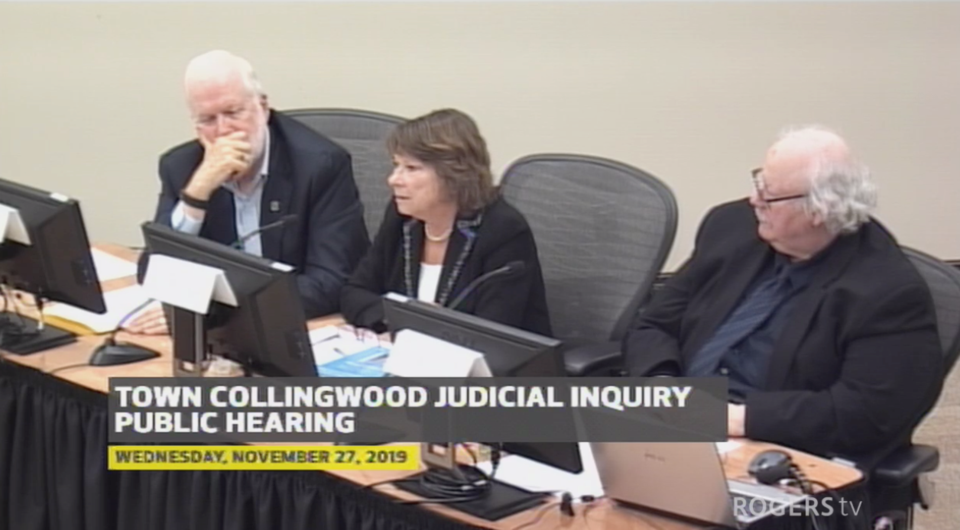The line separating staff and council should be a bright one according to a panel of experts selected to advise the commissioner of the Collingwood Judicial Inquiry on good governance.
John Fleming, a former chief administrative officer and the current integrity commissioner for Caledon, was the first to use the phrase “bright line” in his testimony today (Nov. 27) when he said there should be a bright line between a governing body and staff.
“If the bright line isn’t respected, it’s the first step to what potentially becomes chaos,” said Fleming. “If the roles become confused, it’s not in the public interest or the interest of the community. It tends to supplant professional staff advice with public opinion.”
Fleming was joined on the panel by Greg Levine, who has also worked as an integrity commissioner, and Anna Kinastowski, who was city solicitor for Toronto for 14 years where she oversaw a team of 300 staff.
“An ideal of service is putting others before self,” said Levine.
He pushed the importance of a written code of conduct to establish a written set of rules.
He summed up his interpretation of law with a verse from the Bible
“In everything do to others what you would have them do to you,” he quoted.
Kinastowski put it a different way.
“What I always told my staff was, ‘what would your mother say if she saw your behaviour splashed on the front page of The Toronto Star?’” she said.
She was brought in as city solicitor in Toronto when the two Toronto leasing inquiries were beginning. She referenced a report by Commissioner Denise Bellamy at the outcome of those inquiries (the report was released in 2005) several times during her testimony.
Kinastowski said she was initially disappointed to be asked to come to Collingwood for the policy phase of the local public inquiry.
“Those who don’t know history are bound to repeat its mistakes,” she said. “The recommendations prepared [by Bellamy] at the time speak to similar issues … they have stood the test of time.”
This current third phase of the Collingwood Judicial Inquiry hearings are considered a policy phase, and include testimony from experts in municipal governance, conflict of interest, lobbying, and procurement.
The first phase of the inquiry dealt with the town’s decision and action to sell 50 per cent of Collus to PowerStream in 2012. The second phase focused on the allocation of those sale proceeds to build two recreation facilities in town.
The final outcome of the inquiry will be a report from Commissioner Frank Marrocco which will include his own recommendations based on what he learned through all three phases of the inquiry.
The panel today was focused on good governance.
Witnesses recommended towns have documents in place for a whistleblower policy that protects whistleblowers from reprisal, written code of conduct, and well-defined roles that respect the ‘bright line’ between staff and council.
“It starts with the mayor and CAO, if they are ethical and respect that line, then the rest of staff will respect that line as well,” said Kinastowski. “If there is a blurring, it will continue down the ranks.”
While there was no specific mention of issues that came up during the first and second phase of the inquiry, or evidence presented. There was a question about individual councillors being involved in drafting staff reports.
Fleming said it was a slippery slope to be avoided.
Levine said, even though some might say things are different in small towns, there are fundamental roles and those need to be respected.
“Collingwood is not a small town,” he added. “Paisley is a small town.”
Kinastowski said a staff report needs to provide the best professional advice. It was her practice not to show a staff report to any member of council until it was completed and signed by the author.
“There should be no political input into staff reports,” she said. “The recommendations in the report must be those of staff and not political recommendations … they must be amended or deleted on the floor of council.”
The hearings for the third phase of the inquiry will continue tomorrow with a panel focused on conflict of interest in the municipal context and the Municipal Conflict of Interest Act beginning at 11:30 a.m.
You can watch the hearing live at the town hall council chambers, on Rogers TV, or online here.



